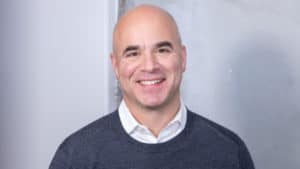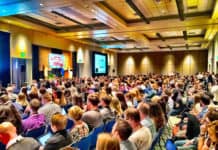 Speaker selection has always been a key piece of event planning, but now that in-person events are coming back, it’s important to know what has changed regarding choosing speakers.
Speaker selection has always been a key piece of event planning, but now that in-person events are coming back, it’s important to know what has changed regarding choosing speakers.
The speakers bureau business, like everything else in the events world, has been changed by the past few years of COVID shutdowns and flips to virtual events. Now that we’re coming back to in-person events, what’s changed — and what hasn’t — when it comes to the speaker-selection process?
Prevue caught up with Martin Perelmuter, President and Cofounder of Speakers Spotlight, which celebrated its 25th anniversary in 2020 at the height of the pandemic’s early days. “This was a moment of reflection for us,” Perelmuter said. “Speakers Spotlight was founded on the belief that a speech can be a catalyst for positive change. At a time when anxiety was high, uncertainty was rampant, and connection was needed most, we knew that we could help, or, more importantly, we knew that our speakers could.”

Prevue: How has speaker selection changed since 2019?
Perelmuter: Things hadn’t changed much in our 25 years leading up to 2020. Then everything changed overnight.
The initial change, obviously, was the shift to virtual. Many of our clients were very experienced and highly educated meeting professionals who had been planning conferences for decades and brought a lot of expertise to the speaker selection process. But most of them had never done virtual before, and they weren’t sure how it would work (or even if it would work at all), what format they should use, what technology platform they needed. And on the speaker side, engaging audiences on a little screen versus on stage requires a whole different skill set — it was a huge change for everyone.
So our role became much more consultative. We went from just helping planners find the best speaker to helping them through the whole process, from what kind of platform and technology to use to the setup the speaker would need to how that speaker would engage the audience. We were consulting with both planners and speakers to help them make the pivot.
At the end of the day, our biggest job is to help our clients make better buying decisions and find the speaker that’s going to help them achieve their goals. But the number of factors involved just multiplied because it planners couldn’t just look at a video of a speaker on stage and some testimonials and say great, they’re wonderful.
Then once in-person started coming back, the stakes were higher because they were bringing people together — and the costs are so much higher to do an in-person than virtual event — for the first time in a few years and they really want it to be amazing.
On the attendee side, a lot of people couldn’t wait to get back to in-person events, while other attendees were like, “I don’t know if I want to do this.” The stakes got that much higher to ensure all elements of the event are phenomenal so that people think it was worth the cost and travel hassles.
Prevue: How are speakers handling the return to in-person events?
Perelmuter: Some speakers are just dying to get back on the road, while others are just like, “Hey, I’m making great money speaking from my living room. So why do I want to go anywhere?”
But what we’re seeing for our business is that in-person is back in a big way —about 75% to 80% of our bookings are in-person now. There’s still a place for virtual but other than the high-end celebrity-type speakers who are in such high demand that they can dictate their terms, most speakers need to get back on the road. If they’re only willing to do virtual, then probably their business is going to be down significantly.
Most speakers who are now back are loving it. Most people I’ve talked to really missed the audience feedback and the whole experience of speaking not to camera run at home, but to a live audience, getting that instant response.
Prevue: How has Speakers Spotlight changed to accommodate the more agile and resilient and adaptable events market of 2023?
Perelmuter: We always did everything we could to get the decision right, but now there’s more scrutiny on every decision, so we must be able to provide the tools to enable planners to make that decision. In some cases, this just means more and better video and having the all the collateral and materials planners need to make an informed decision.
Speakers also had to update their collateral: Almost everything people were talking about in 2019 is no longer as relevant. So we had to get footage of speakers as they’re getting back in person so clients can see what this person is talking about now.
There’s also a lot of risk aversion in the decision-making process now. Obviously, after everything that happened in 2020, a lot of clients are scrutinizing contract terms — what happens if we must cancel or what happens if the speaker cancels or what happens if … — so there’s a lot more focus on how we can help the client if something goes wrong.
When in-person just started to come back, we had several situations where a speaker would test positive for COVID the night before their event. In most cases, the clients said, “Well, we can’t have them here if they’re tested positive.” In some cases, they would switch the speaker to virtual if they were feeling up to it. In some cases, we had to find a replacement. So there was a bit of scrambling.
And with the travel uncertainty we have now, we must make sure that speakers are getting in early as early as they can —again, just a lot more focus on contingency planning. We always were there for clients 24/7, but the likelihood of something happening out of the ordinary just went up significantly because there’s just many more factors in play.
Planners also have become so much more adaptable because before all this cancellation was very, very rare. It’s still rare but it does happen more than it did before.
The whole industry has become much more agile and resilient and adaptable. And forgiving. Whereas once attendees might have felt ripped off if a speaker who was the whole reason they came to this conference was just going to be on a screen, now people are much more like, “Yep, we get it. We’ve all been there, done that.”
Prevue: Any thoughts to share on what new challenges and opportunities are on the horizon for speakers (and those who hire them for their meetings and events)?
Perelmuter: We’re still in an in-between time and nobody knows for sure what’s going to happen. One thing we’ve all learned, though, is that nobody can predict what’s going to happen next.
But having said that, for speakers it’s all about the value you provide. Before, some speakers thought the value they provide was getting on stage for an hour and entertaining, inspiring, educating, whatever the reason they were there, and then they get off stage and that’s the end of their interaction with this group.
Now I look for the speakers who are looking at how they can add value to this organization, to this event, beyond just their participation for an hour. Maybe there’s digital learning tools they can use, some virtual follow-up sessions, things like that, that can help keep the learning alive and keep the momentum going after an event.
There’s some that do that wonderfully already — to me, those are the speakers who are going to be best positioned for the future. Because the purpose of an event is not just limited to the two or three days that people get together — it’s what’s the impact going to be well beyond that? And the speakers who can provide greater impact beyond the event, they are going to be well-positioned moving forward.
The reason I got into this business in the first place was seeing the potential that a speaker can have to change someone’s thoughts and ideas about a particular topic. And when you change the way someone thinks and feels about something, you might change the way they behave. And if you change their actions, that’s how change happens on a bigger scale.
I’ve always said that we don’t want to be in the slot-filling business — we want to be in the behavior-change business, the impact business. It’s pretty cool that we can facilitate that and be catalysts for change. A speaker can’t follow every attendee around for the next 12 months and make sure they’re doing the things that they should be doing. But they can plant those seeds and if they do an effective job, that can have monumental impact on your business, your life and your career.
It’s an exciting time for the events industry. While no one wanted the pandemic to happen and it certainly hasn’t been easy, it’s like that expression, “Never let a crisis go to waste.” Hopefully, people won’t slip back to the way they did things before. I don’t think they will. I think people have learned a lot about themselves and about how they interact with one another.
You May Also Be Interested In…
Black Speakers Collection Keeps Growing
ChatGPT Is Great for Events (Sort of)









